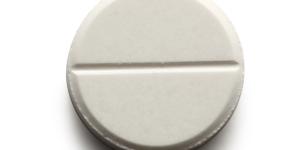How Long Does it Take for Prednisone to Work


Prednisone is a steroid generally indicated for the treatment of different types of arthritis, including rheumatic, osteoarthritis, ankylosing spondylitis, psoriatic arthritis and related conditions like vasculitis. The drug is also used for managing allergic reactions, aspiration pneumonia, bursitis, dermatitis herpetiformis, Loeffler's syndrome, psoriasis, uveitis and corneal ulcers. It is very much similar to the corticosteroid hormone cortisone, something naturally produced by a human body’s adrenal glands.
If you have noticed a lot of -itis conditions, this is because prednisone works by reducing inflammation in affected areas and suppressing your body’s immune system. If you have been prescribed Prednisone for your condition, then you may be wondering: how long does it take for prednisone to work? Read this oneHOWTO article to find more information about this drug and its effectiveness.
What is Prednisone used for?
The main purpose of prednisone is to suppress the immune system. This means that the actions the body takes to defeat disease are stifled. While this might seem counter productive to ensuring the health of an individual, Prednisone's effects are used to bring a balance to the body. This is because certain diseases cause the immune system to overwork which can be just as detrimental to our health as if it doesn't work enough.
When we have inflammation, it is a result of our body trying to fight a disease, pathogen or allergen. Its purpose is to eliminate this cause of cell destruction and begin the process of tissue repair. Prednisone acts to counteract inflammatory disease which cause too much inflammation. However, this is not its only purpose. Autoimmune diseases are pathologies which cause the immune response to behave abnormally. Prednisone is taken to redress the balance caused by these abnormal immune responses.
Prednisone is given to both adults and children for various specific medical conditions. The dosage and administration will depend on the type of disease it is prescribed to treat as well as the severity of the problem. Some specific conditions Prednisone treats include:
- Different types of arthritis: osteoarthritis, ankylosing spondylitis (affecting the spine) and rheumatoid arthritis are conditions which affect the joints. They cause inflammation, stiffness and movement restriction. Not only can swollen joints lead to a restricted functionality, it can also be very painful. Arthritis can't be cured, but it can be managed with dugs such as prednisone.
- Bursitis: this is when sacs of synovial fluid are inflamed, leading to inflammation. It can happen in various parts of the body and prednisone is used to treat the inflammation.
- Synovitis: related to bursitis, this is caused by inflammation of the synovial membrane itself.
- Loeffler's syndrome: caused by a parasitic infection, this is when white blood cells accumulate in the lung. Prednisone helps to restore the immune system.
- Uveitis: this is an inflammation of the uvea, part of the eye. Other eye problems such as corneal ulcers, chorioretinitis and keratitis are also treated with prednisone.
- Asthma: while asthma is still relatively poorly understood, Prednisone has been proven effect to manage some of its symptoms.
- Neoplasms: a neoplasm is an excessive growth of tissue which can happen for various reasons. They can develop into tumors, some of which are benign, but others which can be cancerous.
- Neuritis: this is the inflammation of a nerve which can happen all over the body and be the result of various other diseases such as Lyme's disease.
- Lupus: this is an autoimmune disease which is not well known scientifically. However, symptoms such as a face rash have been known to be eased by the steroidal drug.
- Skin conditions: one of the most obvious types of inflammation is when it affects the skin as rashes and swelling. Psoriasis can lead to flaky and damaged skin which varies in severity, but something like dermatitis herpetiformis can cause blisters and pustules. A strong drug such as prednisone may be used to treat acute cases.
These are only some of the conditions and diseases which may be helped by the use of prednisone. Many of them are elated or cover larger conditions, some of which we are still relatively unsure exactly how they function. Pain relief is also an important aspect of the steroid as back pain and neck pain caused by inflammation can be reduced.
Recommended dosage of Prednisone
While many steroids and corticosteroids like Prednisone can be given to the patient through an injection, Prednisone itself is taken orally in the form of tablets only. It is generally available in 1mg, 5mg and 50mg strengths. However, it is possible to find 10mg and 40mg tablets as well. It is usually taken orally in tablet form, but it can be given in the form of injections. Epidural steroid injections can be given, but usually in acute circumstances. The recommended dosage can vary from 1 to 100mg per day, but most dosages are between 5mg and 60mg.
The recommended dosage depends on the age, weight and gender of the patient, along with the medical condition to be treated and its severity. Time of day may also affect the amount of a dosage. For example, a 2012 study suggests that the smallest dose possible should be taken for rheumatoid arthritis patients just before bed[1]. Your physician may suggest increasing or decreasing your dosage as per your individual response to the medication.
Usually, a patient is recommended to take Prednisone only once in a day, preferably in the morning along with breakfast. Doing this will mimic the body’s natural corticosteroid hormone production process and it will more easily incorporate in normal living. However, your physician may recommend you to take a dose of Prednisone every other day, or even 2-3 times a day, depending on the severity of your condition and your individual response to the treatment. Do not attempt to take more prednisone so the effects are noticeable faster. You may be able to combine it with natural alternatives, but it is essential you discuss any treatment option with a qualified physician.
The type of disease or condition being treated has an important bearing on the dosage. Prednisone is also used to treat symptoms of multiple sclerosis. While this has proven relatively effective, the first dosage of prednisone is very high[2], as are subsequent doses when compared to other conditions.
The amount of a dose can have an affect further down the line on its efficacy and also related health problems. A study looking at adult minimal change disease (MCD) shows that if a patient relapses, those with high initial doses will have less favorable outcomes than those with lower doses[3].
How long does prednisone take to work?
Prednisone is an effective pill which starts working within a few hours of taking the first pill. You should start feeling better after the very first dose of the medicine. However, the severity of the symptoms will have a large bearing on how long it takes for prednisone to work. Prednisone injections are faster acting that tablets, but the reduction of symptoms will take a similar length of time.
However, some patients with a very severe condition can start feeling the effects after 2-3 days of beginning the treatment. If you are using delayed release tablets of Prednisone, the drug will be released at least 4-6 hours after taking the pill. So, you will see the effects only after 6-8 hours of taking the medicine. If you happen to miss the medicine on the scheduled time, take it quickly as soon as you remember it. However, if it is time to the take the next dose, it is advised to skip the dose that you missed and start taking the medicine as per the regular dosing recommendation. You are never prescribed to take double dose.
The amount of time it takes for prednisone to work will also depend on the type of condition being treated. For arthritis and other longstanding conditions, it may take 2-4 days. For other less chronic problems, the effects may act more quickly.

Side effects of Prednisone
You may start seeing side effects if you take prednisone more and longer than required. Some of the side effects that you might experience include:
- Difficulty sleeping
- Depression and irritability
- Increased appetite
- Facial swelling
- Upset stomach, indigestion, nausea
- Blurry vision
- Changes in menstrual cycle
- Increased blood sugar and blood pressure levels
- Glaucoma or cataracts
As it is a steroid, abuse of prednisone does occur. This may be for people who want to increase their general fitness or who want to gain an advantage in sports. Even short term use can have detrimental effects with one in five American adults in a commercially insured plan were given prescriptions for short term use of oral corticosteroids during a three year period, with an associated increased risk of adverse events”[4] according to a 2017 study.
Steps to maximize efficacy of Prednisone
While you are taking prednisone, you should take it with food in order to reduce side effects like nausea. Follow an effective diet plan to keep your weight maintained, as Prednisone can sometimes increase your hunger, due to which you end up eating more. As prednisone can lead to loss of vitamin D and calcium, you may be prescribed some supplements to go along too.
Regular blood tests may be taken to evaluate the effectiveness of the medicine and to decrease or increase your dosage as needed. When you are treated completely, prednisone is not stopped abruptly, and needs a gradual reduction in dosage. Sudden stopping of the medicine can lead to serious side effects in the long run. So, whatever you do, always talk to your doctor beforehand.
This article is merely informative, oneHOWTO does not have the authority to prescribe any medical treatments or create a diagnosis. We invite you to visit your doctor if you have any type of condition or pain.
If you want to read similar articles to How Long Does it Take for Prednisone to Work, we recommend you visit our Drugs & supplements category.






